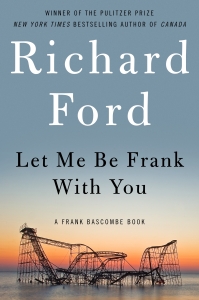If you’re a Boomer, then Frank Bascombe is one of us, and it’s nice to have him back and once more pondering the past, fretting about the future and coping with an unsettled present. His creator, Richard Ford, has somewhat begrudgingly returned Frank to us in Let Me Be Frank With You, continuing a life started nearly 30 years ago in The Sportswriter (1986), picked up again in the Pulitzer-winning Independence Day (1995) and seemingly wound down in The Lay of the Land (2006). But there always seemed something a little too easy about the outcome of the last novel, something left dangling in a tangled life marked by sorrow, loss, moments of joy, hopes, longings, failure and success.
And so now Ford returns to his everyman in response, he admits, to requests from readers, but also a desire to touch on “the consequences of a hurricane that the media wouldn’t pay attention to.” In other words, the human debris left behind to be dealt with long after the storm — in this case, Hurricane Sandy and its disorienting aftermath that causes Frank to realize nothing is here to stay.
He’s now 68, still living in New Jersey, contentedly married, retired from selling real estate, and aware of and troubled by both the liberations and challenges of creeping age. In four interconnected novellas, Frank deals with his “new normal,” awakens to the need to savor the little moments, even accepts that less is more as he jettisons even friends. He’s not always lovable, sometimes not even likable in his comments and actions, but that’s what makes him believable on the page.
Frank is first drawn back with some trepidation to the Jersey shore by Arnie, an old friend who wants him to see the remains of his beach house flipped off its foundation by the storm surge. For Frank, it’s also a return home – the ruined house is one he lived in and then sold to Arnie. As they survey the damage and dance around the new reality imposed by the hurricane, there’s a brief human connection that surprises Frank even while he pulls away from it, as Arnie says, “Everything could be worse, Frank.”
then sold to Arnie. As they survey the damage and dance around the new reality imposed by the hurricane, there’s a brief human connection that surprises Frank even while he pulls away from it, as Arnie says, “Everything could be worse, Frank.”
Then a woman mysteriously appears at Frank’s house, telling him she once lived there and asking for a brief tour. Frank acts as willing host, a bit like his old real estate days, and discovers through his visitor an unsettling history of the house that leads to an unexpected moment of understanding between two strangers.
Frank’s previous life remains open for examination as he dutifully visits his ex-wife, now dealing with Parkinson’s and again close by in a “state-of-the-art staged care facility” he finds soulless and antiseptic. Yet drawn again into contact with a woman he once loved and suffered with through the loss of a child, Frank cannot avoid touches and tints of the past in which he senses the “faint, rich whiff of our old life long ago.”
Finally, he makes a reluctant pilgrimage to encounter a dying man, once a friend then devolved into acquaintance. For Frank, it’s a face-to-face encounter with what lies ahead, combined with an unwanted confession.
Through it all Ford ably fuels the unmistakable voice of his signature character who ruminates wittily and wisely about family, friendship, love and the general mysteries of life – providing ample reason to both laugh and reflect. Frank has been through a great deal in his existence, now easing into the last lap, yet he continues to wonder about things, revamp his conclusions and muddle onward. As he says, “In my view, we have only what we did yesterday, what we do today, and what we might still do.” Then he determines life is really “teeming and befuddling, followed by the end.” Truth enough, as Richard Ford again brings his deft touch, humor and seamless style to consideration of the everyday things that define us as human.
